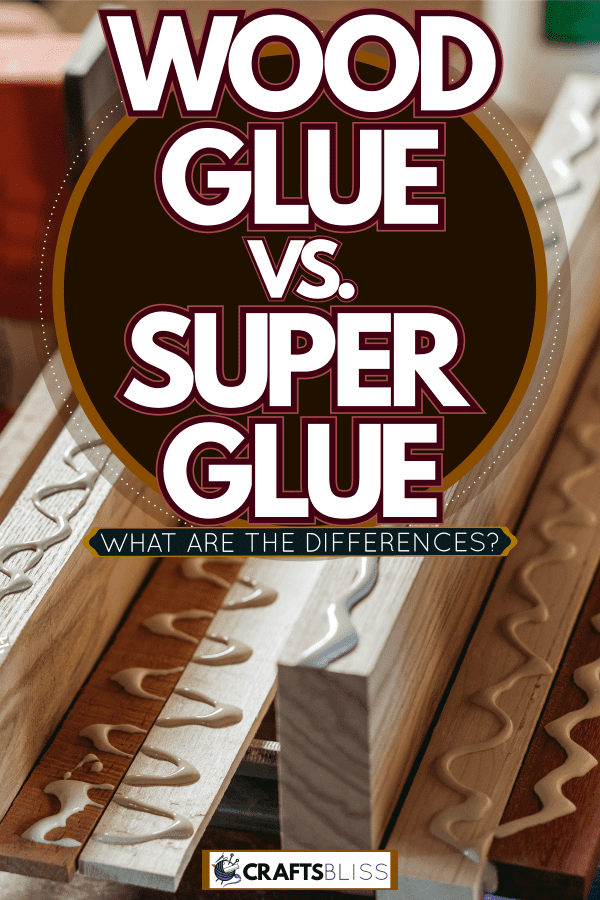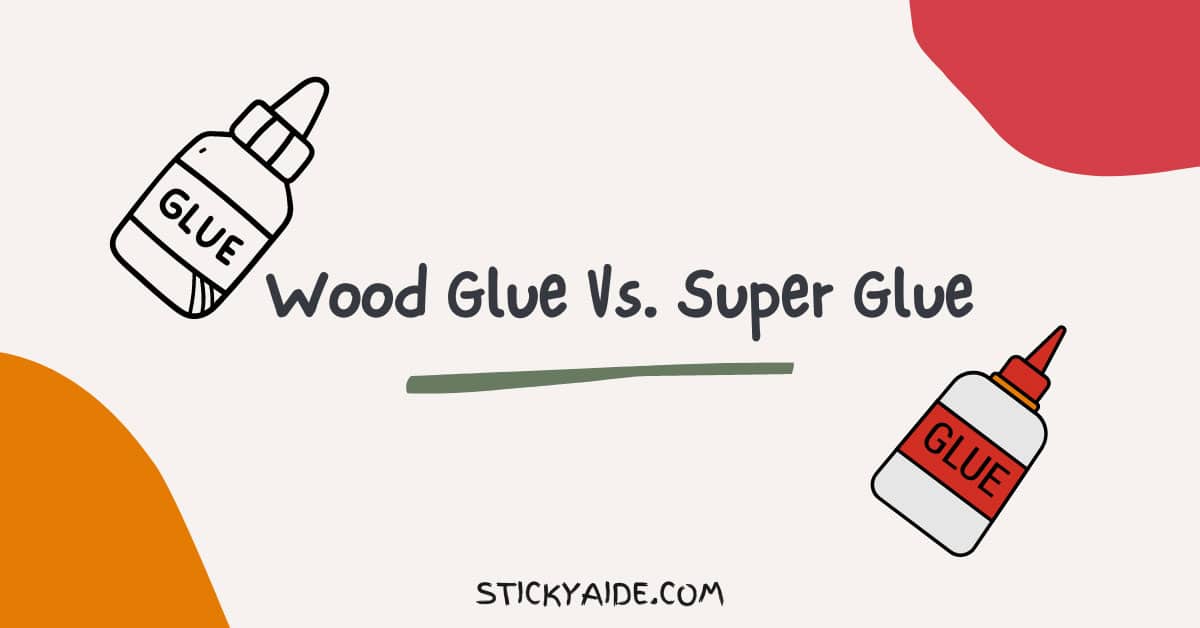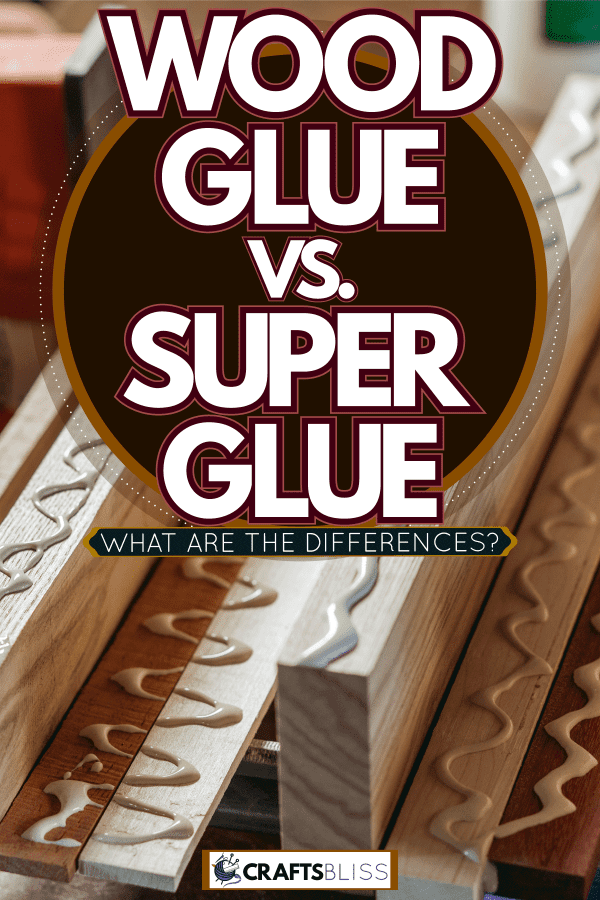Today we’re going to dive into an age-old debate: is wood glue better than super glue? 🤔 Many people have asked this question, and we’re here to shed some light on the matter. So, if you’ve ever found yourself in a sticky situation trying to choose between these two types of glue, keep reading!
Wood glue and super glue are both adhesive heroes, but they have their own unique strengths. Let’s break it down.
When it comes to woodworking projects, wood glue is often the go-to choice. Why? Well, wood glue is specially formulated to bond wood fibers together, creating a strong and durable hold. It’s like a best friend for any carpenter or DIY enthusiast. But does that mean it’s always the better option? Let’s see!
Wood glue and super glue are both great adhesives, but they have different purposes. Wood glue, also known as carpenter’s glue, is better for woodworking projects. It provides a strong bond and is resistant to water and heat. On the other hand, super glue, also known as cyanoacrylate adhesive, is ideal for quick fixes and bonding materials such as plastic, metal, and ceramics. Choose the glue that suits your specific needs and project requirements.

Is Wood Glue Better Than Super Glue?
Wood glue and super glue are two popular adhesives used in various projects and applications. While both serve the purpose of bonding materials together, they have distinct characteristics that make them suitable for different situations. In this article, we will explore the differences between wood glue and super glue, their strengths and weaknesses, and determine which one is better for specific use cases.
Strength and Durability
When it comes to strength and durability, wood glue is the clear winner. Wood glue, also known as carpenter’s glue, is specifically designed to bond wood surfaces. It creates a strong, long-lasting bond that is resistant to moisture, heat, and changes in temperature. Wood glue works by penetrating the wood fibers and forming a bond as it dries. This makes it ideal for woodworking projects, furniture repair, and other applications where a strong bond is required.
On the other hand, super glue, or cyanoacrylate adhesive, is known for its instant bond. It works by reacting with moisture in the air, forming a strong bond within seconds. Super glue is versatile and can bond a wide range of materials, including wood, plastic, metal, and ceramics. However, while super glue is strong, it may not have the same level of durability as wood glue. It can be more prone to brittle or break over time, especially in applications where there is stress or movement.
In summary, if you need a strong and durable bond for woodworking or similar applications, wood glue is the better choice. Super glue may be suitable for quick fixes or bonding non-wood materials, but it may not withstand the same level of stress or longevity as wood glue.
Application and Versatility
Wood glue and super glue also differ in terms of application and versatility. Wood glue typically comes in liquid form and requires clamping while it dries to ensure a secure bond. It has a longer curing time, often needing several hours or overnight to fully set. Wood glue is easy to work with, as it can be sanded, stained, and painted over once dry, making it ideal for woodworking projects.
On the other hand, super glue comes in liquid or gel form and requires minimal clamping or pressure during application. It cures within seconds, providing an almost instantaneous bond. Super glue is excellent for small repairs, bonding small parts together, or applications where quick drying time is essential. However, because of its fast curing nature, it does not allow for adjustments or repositioning once applied.
In terms of versatility, super glue has the upper hand. It can bond a wide range of materials, including plastic, rubber, ceramic, and metal, making it suitable for various household and DIY projects. Wood glue, while primarily designed for wood, can also be used on other porous materials like paper and fabric.
In summary, if you need an adhesive with more versatility and quick bonding properties, super glue is the better option. Wood glue is specifically tailored for wood surfaces and is ideal for woodworking projects that require a strong and durable bond.
Waterproof Properties
Another essential factor to consider is the waterproof properties of the adhesives. Wood glue, particularly those labeled as waterproof or weatherproof, offers excellent resistance to moisture. It can withstand exposure to water, making it suitable for outdoor projects or environments prone to humidity or moisture. The moisture-resistant properties of wood glue also allow it to be used in applications like kitchen or bathroom repairs, where constant exposure to water is expected.
On the other hand, super glue is not inherently waterproof. It can lose its bond or weaken when exposed to water. However, there are specialized super glue formulas available that offer water and moisture resistance. These formulas are specifically designed for applications that require waterproof bonding, such as repairing water pipes, aquariums, or outdoor equipment.
Ultimately, if you require an adhesive that is resistant to water or moisture, opt for a waterproof wood glue. Super glue can also work in waterproof applications if you specifically choose a formula designed for that purpose.
—
Comparing Wood Glue and Super Glue: Pros and Cons
In the debate between wood glue and super glue, each adhesive has its strengths and weaknesses. Let’s take a closer look at the pros and cons of both adhesives to help you determine which one is better suited for your needs.
Wood Glue: Pros and Cons
Pros:
1. Strong and durable bond, ideal for woodworking projects.
2. Resistant to moisture, heat, and changes in temperature.
3. Can be sanded, stained, and painted over once dry.
4. Easy to work with and allows for adjustments during application.
Cons:
1. Longer curing time, often requiring several hours to overnight.
2. Requires clamping or pressure during drying.
3. May not be as versatile as super glue, primarily designed for wood surfaces.
4. Can be difficult to remove if excess glue is applied or if repositioning is necessary.
Super Glue: Pros and Cons
Pros:
1. Instant bond within seconds, no clamping required.
2. Versatile and can bond a wide range of materials.
3. Quick drying time, ideal for small repairs or applications requiring fast results.
4. Requires minimal adjustments or repositioning during application.
Cons:
1. May not have the same level of durability as wood glue.
2. Can become brittle or break over time with stress or movement.
3. Not inherently waterproof, requires specialized formulas for water-resistant applications.
4. Can be challenging to remove if excess glue gets on surfaces or skin.
—
Factors to Consider in Choosing the Right Adhesive
When choosing between wood glue and super glue, here are some factors to consider that will help you make an informed decision:
1. Material
Consider the type of material you are bonding. Wood glue is specifically formulated for wood surfaces, making it an excellent choice for woodworking projects. Super glue, on the other hand, can bond a wide range of materials, including wood, plastic, metal, and ceramics.
2. Strength and Durability
If you need a strong and durable bond that can withstand stress or movement, wood glue is the better choice. It provides a long-lasting bond that is resistant to moisture and temperature changes. Super glue is suitable for quick fixes or small repairs but may not have the same level of durability as wood glue.
3. Application Time and Adjustability
Consider the time it takes for the adhesive to dry and set. Wood glue typically has a longer curing time, often requiring several hours or even overnight. Super glue, on the other hand, dries within seconds. Additionally, consider if you need the ability to make adjustments or reposition the materials during application. Wood glue allows for adjustments, while super glue bonds almost instantly.
4. Waterproof or Water-Resistant Properties
If your project requires resistance to water or moisture, opt for a waterproof wood glue or a specialized water-resistant super glue formula. Regular super glue may lose its bond when exposed to water.
5. Versatility
Consider the range of materials you need to bond. Super glue is more versatile and can bond various materials, while wood glue is primarily designed for wood surfaces.
By considering these factors and understanding the strengths and weaknesses of wood glue and super glue, you can make an informed decision on which adhesive is better suited for your specific project or application. Remember to always follow the manufacturer’s instructions for proper and safe use of the adhesive.
Key Takeaways: Is Wood Glue Better Than Super Glue?
- Wood glue is specifically designed for joining wood pieces together.
- Super glue is a powerful adhesive that works well on a variety of materials, including wood.
- Wood glue provides a stronger and more durable bond for woodworking projects.
- Super glue dries quickly and forms a strong bond, but it may not be as durable as wood glue in the long run.
- The choice between wood glue and super glue depends on the type of project and the desired level of strength and durability.
Frequently Asked Questions
When it comes to woodworking and repairs, choosing the right adhesive can make all the difference. Here are some common questions about wood glue versus super glue.
1. Can wood glue be used instead of super glue?
Yes, wood glue can often be a suitable replacement for super glue, depending on the particular project. Wood glue is designed specifically for bonding wood fibers together, making it ideal for woodworking and repairing furniture. It provides a strong, durable bond that dries clear, allowing the natural beauty of the wood to shine through.
While super glue can also bond wood surfaces together, it is better suited for small repairs, bonding non-porous materials like plastic or metal, and projects that require a quick drying time. Wood glue, on the other hand, allows for longer working time, making it easier to align and adjust pieces before the glue sets.
2. Is wood glue stronger than super glue?
In general, wood glue tends to be stronger than super glue when it comes to bonding wood surfaces together. Wood glue is formulated to penetrate and bond with the fibers of the wood, creating a strong and durable bond. It also has more flexibility, allowing it to withstand changes in temperature and humidity without losing its grip.
Super glue, on the other hand, forms an instant bond that is extremely strong but can become brittle over time. It may not be as effective in situations where the bonded materials are subject to stress or movement. For most woodworking applications, wood glue is the preferred choice due to its strength and reliability.
3. Can you use super glue on wood instead of wood glue?
While super glue can be used on wood surfaces, it may not be the best choice for all woodworking projects. Super glue is a fast-acting adhesive that forms an instant bond, making it suitable for small repairs and bonding non-porous materials like plastic and metal. However, it may not penetrate the wood fibers as effectively as wood glue, which is specifically designed for bonding wood surfaces.
If you plan on using super glue on wood, it is important to ensure that the surfaces are clean and properly prepared. Applying a thin layer of super glue and using clamps to hold the pieces together can help achieve a stronger bond. However, for larger woodworking projects or applications that require long-term durability, wood glue is generally recommended.
4. Does wood glue dry faster than super glue?
No, wood glue typically takes longer to dry than super glue. Wood glue often requires several hours to overnight for the bond to fully cure and achieve its maximum strength. This longer drying time allows for more flexibility and adjustment of the bonded pieces before the glue sets.
Super glue, on the other hand, dries almost instantly upon contact with the air. It forms a strong bond within seconds, which can be advantageous for quick repairs or projects that require immediate bonding. However, this quick-drying characteristic can limit the time available for proper alignment and adjustment.
5. Can you use both wood glue and super glue together?
Yes, it is possible to use both wood glue and super glue together in certain situations. This technique, known as hybrid gluing, combines the strengths of both adhesives. For example, you can use wood glue to create a strong, long-lasting bond between wood surfaces and then use super glue to provide quick and instant adhesion for smaller parts or delicate connections.
When using a combination of wood glue and super glue, it is important to follow the instructions carefully and apply the adhesives in the correct order. Applying wood glue first and allowing it to fully cure before adding super glue can help ensure a successful and durable bond.

Summary
So, which is better: wood glue or super glue? It really depends on the situation.
Wood glue is great for bonding wood together, creating a strong and durable hold.
Super glue, on the other hand, works well for small repairs and quick fixes.
Both glues have their strengths and weaknesses, so choose the one that suits your needs.
Remember to always follow the instructions and use them safely. Happy gluing!
